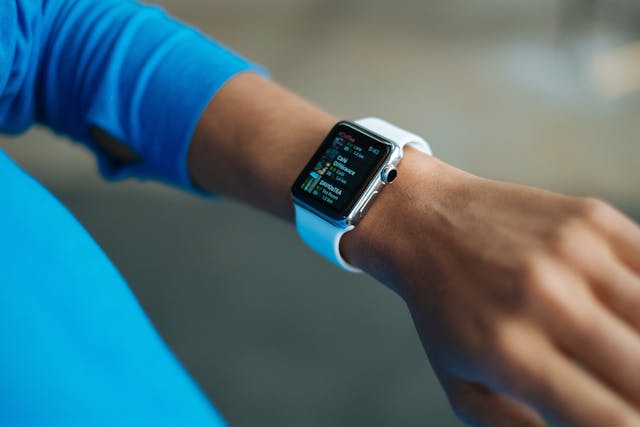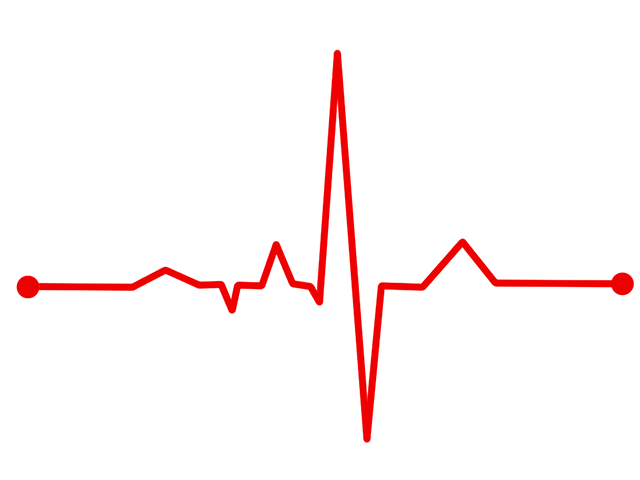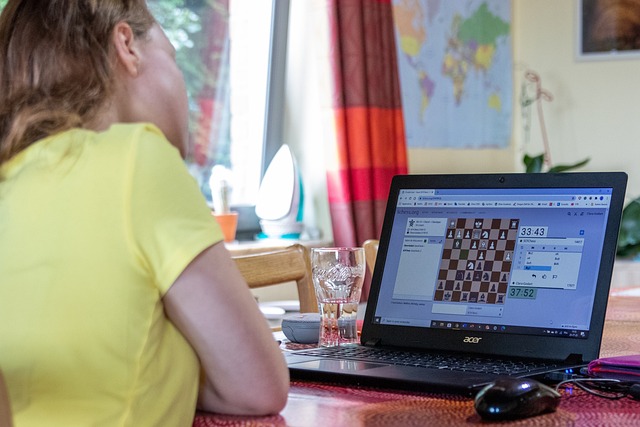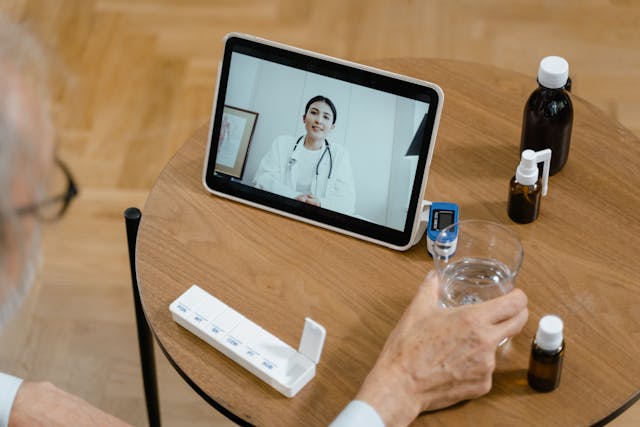Technology gets a bad rap sometimes, but it can offer incredible benefits. We all know that having access to innovative tech has transformed the way we work, study and communicate, but what about the impact of technology on our health and well-being?In the digital age, technology plays a pivotal role in maintaining and boosting our health. From fitness apps to online consultations, the tools available can significantly enhance our well-being. For instance, if you need specialized dental care, consulting an experienced oral surgeon in Chattanooga TN, can ensure you receive top-notch treatment. Embracing technology and expert medical advice together allows you to maintain a healthy lifestyle more effectively
Image credit: https://www.pexels.com/photo/person-wearing-white-silicone-strap-black-smartwatch-267394/
Activity tracking
Being active is one of the best ways to lower your risk of developing acute injuries and chronic conditions. Regular exercise reduces the risk of heart disease, type 2 diabetes, some forms of cancer and Alzheimer’s disease while making us more resistant to injuries and stress. If you exercise daily, you’re also more likely to sleep well and feel more energised. The benefits of exercise have been well-documented for decades, but we’re more aware of them now as a result of using technology.
One of the most exciting developments is activity tracking. Today, we can use smartwatches and phones to access real-time updates on our activity levels or monitor movements using a dedicated fitness tracker. Using activity trackers makes it quick and easy to assess how active you are and make changes to improve your health. Research shows that people who use trackers are likely to be more active. Setting targets, for example, 10,000 steps a day or 150 active minutes per week, can help to motivate individuals, encouraging them to get up and move their bodies.
Picture via https://www.pexels.com/photo/crop-woman-using-devices-for-pulse-controlling-4428992/
Monitoring your heart rate
It’s possible to check your pulse manually, but this is not always accurate and many people don’t know how to do it properly. Using technology, it’s now faster and easier than ever to monitor your heart rate. Devices give you a reading in real time, enabling you to check that your heart rate is steady. If your heart rate is lower than average, or your readings seem to spike regularly, it’s worth seeking advice and getting checked out. Sudden falls can also trigger alerts in some devices, for example, if the user has an accident, some phones and wearables will automatically contact the emergency services.
Image source: https://pixabay.com/illustrations/heart-rate-bpm-ecg-ekg-1375324/
Keeping your brain active
When we talk about health, we often concentrate on our bodies, but it’s critical to keep your brain in shape. As we age, it’s common to experience signs of cognitive decline. Keeping the brain busy can help to improve your memory and cognition, particularly in middle and old age. Some studies suggest that brain training and keeping busy can lower the risk of developing symptoms of Alzheimer’s disease.
Technology makes it easy for anyone to access games, puzzles and quizzes. If you have a smartphone, a tablet or a computer, you can play at the touch of a button without having to find an opponent or teammate. From chess and solitaire to general knowledge quizzes and problem-solving, there are activities to suit everyone. You can also do memory tests, play online card games and explore new hobbies, such as learning a language or playing a musical instrument.
If you download apps or join online communities with other players, you can save and compare results, take on competitors and make friends. It’s beneficial to play frequently to hone your skills and keep your brain ticking over.
Picture from https://pixabay.com/photos/online-chess-tournament-laptop-girl-5906378/
Improving your diet
Most of us know that eating well is beneficial for our health, but do you know how healthy your diet really is? If the answer is no, there are technological solutions ready and waiting to help you transform your eating habits.
One of the best ways to use tech to improve your diet is using an online food diary. You can download apps, which provide detailed nutritional information based on daily entries. All you have to do is enter the foods you eat and you’ll be able to see how healthy and balanced your diet is instantly. The report will flag issues, such as low iron or fibre intake or high sugar content, and give you an estimate of your daily calorie intake. This is important if you’re trying to lose or gain weight. Experts recommend around 2,000 calories per day for women and 2,500 for men, but you should adjust this figure in line with your body size and your activity levels. If you have a physically strenuous job, for example, you may need more calories than someone with a sedentary lifestyle.
Online recipes are another excellent tool we can use to enhance nutrition. If you’re keen to expand your repertoire or develop your culinary skills, you don’t have to buy books or search through family archives. You can open a browser or use an app to access hundreds of recipes within seconds. Use filters to find meals that suit your tastes and dietary requirements, or narrow down options based on how much time you’ve got or which ingredients you have in the cupboard. You can view nutritional information, including calories per serving and fat, sugar and protein content and save recipes you love.
Image by https://www.pexels.com/photo/variety-of-dishes-1640771/
Enhancing sleep quality
Studies show that around 25% of Brits don’t get enough sleep. A sleepless night from time to time won’t do much harm, but if you miss out on high-quality sleep regularly, it will take its toll. A lack of sleep can affect everything from your performance at work and your ability to make decisions and focus to your physical health and your mood. If you’re tired, you may experience mood swings and a loss of motivation. You might also find that you’re snappy and irritable and you lose interest in things you usually enjoy.
There are lots of ways to enhance sleep quality, including taking advantage of technological advances. Many of us now use wearable devices to track activity levels and measure metrics like our heart rate and sleep patterns. Gathering information about your sleep habits can help you make changes and learn more about what happens during the night. You can use apps to identify patterns, for example, waking up at similar times each night, and highlight potential causes of disturbed nights. Perhaps you’re going to bed at 10 o’clock one night and 2 am the next day. A lack of sleep routine can be damaging, as it means the internal body clock will be off-kilter. If you can’t sleep and sleep troubles are impacting you, try changing your routine and making sure your environment is tranquil and calm. If self-help techniques don’t work, seek advice from your doctor.
As well as using wearables to monitor sleep behaviours, you could also explore aids such as white noise machines and apps that help you to meditate. White noise is helpful if you don’t like to sleep in silence, you live in a noisy area, or you experience tinnitus (ringing in the ears). You can buy a machine to generate white noise or use apps. If you find meditation helpful to get ready for bed, you can access resources at the touch of a button. Choose from guided meditations or listen to calming music to help you meditate independently.
Image courtesy of https://www.pexels.com/photo/woman-sleeping-935777/
Virtual appointments
Be honest. How often do you get help if you feel unwell? Many of us are reluctant to pick up the phone and book an appointment until we reach the point where we’re really struggling. We’re also not brilliant at keeping up to date with routine tests and screening. One of the main reasons we put off going to the doctor or calling the dentist is a lack of time. If you have a busy schedule, you might wonder how you’re going to fit a trip to the surgery around meetings or childcare commitments. The good news is that technology provides a solution. Virtual appointments and video calls save time and effort for healthcare professionals and patients in cases where the individual doesn’t need to be seen in person. Consultations are quick and easily accessible and you don’t have to worry about travelling.
Another key benefit of virtual health services is beating anxiety. Some people avoid medical and dental appointments because they’re worried. For some, virtual consultations may be less stressful. Online services are also beneficial for people who find it hard to get out, including those who don’t drive, the elderly and people with mobility issues. They also offer greater flexibility for full-time workers and parents looking after young children.
Virtual services became much more prevalent during the Covid-19 pandemic when most hospitals, clinics and community health facilities limited face-to-face contact. Studies show that uptake has increased since restrictions were lifted, with many services offering both in-person and virtual appointments or calls.
Picture by https://www.pexels.com/photo/high-angle-shot-of-a-person-making-a-zoom-call-to-a-doctor-8376171/
We often talk about technology in a negative light, but it offers some incredible advantages. Embracing tech can revolutionise the way we learn and work, but it can also boost our health and well-being. Using technology, we can do everything from monitoring our heart rates and activity levels to enhancing sleep quality and improving our diets. If you’re not already taking advantage of tech, hopefully, this guide will inspire you to start reaping the rewards.












